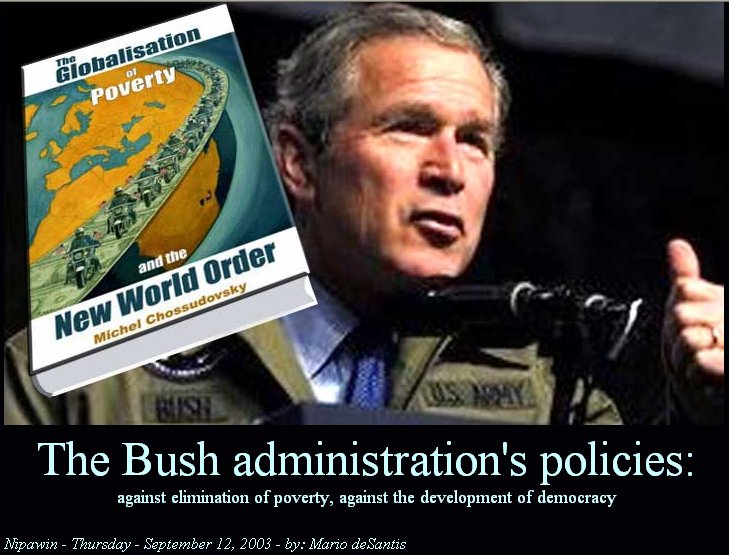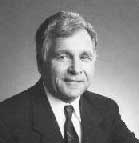Learning Stories
by
Mario deSantis
mariodesantis@hotmail.com
“I am a Canadian, free to speak without fear, free to worship in my own way, free to stand for what I think right, free to oppose what I believe wrong, and free to choose those who shall govern my country.” - -The Rt. Hon. John Diefenbaker, Canadian Bill of Rights, 1960
“The whole judicial system is at issue, it's worth more than one person.”--Serge Kujawa, Saskatchewan Crown Prosecutor, 1991
“The system is not more worth than one person's rights.”--Mario deSantis, 2002
Ensign Stories © Mario deSantis and Ensign
|
|
"We must build and maintain our defenses beyond challenge"--White House, The National Security Strategy of the United States of America, September 2002 "The current system is one of capital creation through destruction"--Michel Chossudovsky, professor of economics at the University of Ottawa, Canada Some months ago I completed a course in System Dynamics sponsored by the Universitat Politecnica De Catalunya, in Barcelona, Spain. In this course I re-learned two concepts, first the appreciation of social and economic differences as they are part of our real world, and second the importance of the natural exponential curve as this curve describes the natural phenomena of our real world. Yet, I am astounded to realise that these two natural concepts don't play a role in the setting of public policies. I have advice for all of the upside down economists, business people, politicians and academicians: get to know System Dynamics and use it! In fact, with the natural understanding of System Dynamics we have a tool to help us create social developments beyond the reach of our narrow focused experts. The World Trade Organization (WTO) is having its summit in Cancun, Mexico, and again the concerns of poor countries who are getting poorer under Free Trade is resurfacing. Therefore, I want to emphasize the need to change our greedy conventional economic mentality which is the main cause of poverty in the world. Unconventional economist J. W. Smith purports that in a globalised economy it is impossible to bridge the gap between rich and poor countries when these countries experience a difference in their workers' pay, and he states:
American domestic and foreign policies affect every other country in the world as the United States has the biggest economy and the most powerful military. Therefore, America could provide a sound leadership to have peace and economic growth at home and abroad. Instead, the Bush administration has specifically endorsed a warrisome elitist domestic and foreign policy and it is consequential that the Bush administration is against the elimination of poverty and against the development of democracy at home and abroad. References Pertinent articles published in Ensign Chossudovsky, Michel The Globalization of Poverty and the New World Order August 2003, Global Outlook, http://globalresearch.ca/globaloutlook/GofP.html deSantis, Mario The tools of Statistics and System Dynamics: The first for private business, the other for public policies August 24, 2002 Ensign System Dynamics Society http://www.albany.edu/cpr/sds/ J.W. Smith Economic Democracy: The Political Struggle Of The 21st Century An extract of the book, http://www.globalissues.org/TradeRelated/Poverty/EconomicDemocracy.asp The Institute for Economic Democracy, about Dr. J. W. Smith http://www.ied.info/about.html |

 Capital accumulation advantage increases or decreases
exponentially with the differential in pay for equally
productive labor: An equally productive worker in the
poorly-paid Third World produces a unique model car, is paid $1
an hour, and produces one model car an hour. An equally
productive worker in the developed world produces another unique
model car, is paid $10 an hour, and also produces one model car
per hour. Each equally productive worker likes, and purchases,
the other's model cars... The $1 an hour worker must work 10
hours to buy one of the model cars of the $10 an hour worker
but, with the money earned in the same 10 hours, the $10 an hour
worker can buy 100 of the model cars of the $1 an hour worker.
While in a homogenized market of many producers there is a 10
times differential in buying power, in direct trades between
each other there is an exponential 100 times differential in
retained wealth. If the pay differential is 5 ($10 to $2), the
wealth accumulation advantage is 25 to 1. If the pay
differential is 2 ($10 to $5), the wealth accumulation advantage
is 4 to 1. When all have access to technology and markets and
pay is equal for equally-productive work, the wealth retained
(and available for accumulation or consumption) by each nation
is equal.
Capital accumulation advantage increases or decreases
exponentially with the differential in pay for equally
productive labor: An equally productive worker in the
poorly-paid Third World produces a unique model car, is paid $1
an hour, and produces one model car an hour. An equally
productive worker in the developed world produces another unique
model car, is paid $10 an hour, and also produces one model car
per hour. Each equally productive worker likes, and purchases,
the other's model cars... The $1 an hour worker must work 10
hours to buy one of the model cars of the $10 an hour worker
but, with the money earned in the same 10 hours, the $10 an hour
worker can buy 100 of the model cars of the $1 an hour worker.
While in a homogenized market of many producers there is a 10
times differential in buying power, in direct trades between
each other there is an exponential 100 times differential in
retained wealth. If the pay differential is 5 ($10 to $2), the
wealth accumulation advantage is 25 to 1. If the pay
differential is 2 ($10 to $5), the wealth accumulation advantage
is 4 to 1. When all have access to technology and markets and
pay is equal for equally-productive work, the wealth retained
(and available for accumulation or consumption) by each nation
is equal.